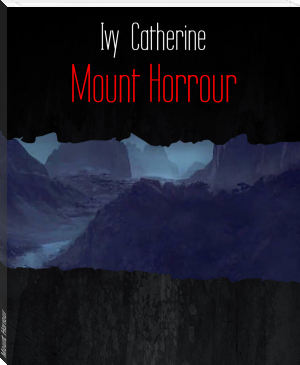Crawl - Aaron Redfern (parable of the sower read online TXT) 📗

- Author: Aaron Redfern
Book online «Crawl - Aaron Redfern (parable of the sower read online TXT) 📗». Author Aaron Redfern
Dawn breaks. As the sky lightens to deep blue and the crack of gray appears to the east, the sounds of the multitudes retreat back into the trees. As light creeps across the sky, they fall silent, turning off one by one like lights in a cityscape, until the woods are quiet again except for the sound of the breeze in the leaves.
The weight of exhaustion has long since overtaken thought. You find the strength to lay yourself down in the grass, rather than fall.
Your dreams are terrible, and full of things that move. They loom huge, twist in and out of sight. You cannot make sense of them. They are on you, crawling, their legs twitching against your skin, and there is something bigger, some suffocating weight that presses you down and holds you while they crawl over you.
In a moment of awareness, you realize that Mike is lying pressed against you, his knees pushed up into yours, his arm bearing down on your shoulder and laid across your chest. He is asleep, and you cannot move from under him. His arm imprisons you. You close your eyes and try to forget.
Your sleep is fitful.
When you wake fully, the sun sits high in the sky. Mike is no longer there. You stand and survey the fields in the full light. Wind blows gently, tossing the grass in ripples that carry on for miles. You can see nothing but the grass and the trees. There is no sign of anything that will tell you where you are or where you can go from here. You know only that you have come from the south, and you will not go back that way.
The landscape swells and dips in soft curves, too long and shallow even to be called hills. They are like the contours of flesh, as though the land is a slumbering body laid out. The field gradually descends from the place where you camped, forming a kind of small valley. It is part of the reason you can see so far.
Mike is down there, peering out into the distance. When he sees you standing, he begins to make his way back. As you wait for him, you brush off your backpack and pull it on.
The far side of the tent, the darkward side, has been torn open. Inside, you find the dead body of an insect-like thing. It is black and chitinous, but the part of you that was a Girl Scout knows that this is not a true insect. It has seven legs, for one thing. And its body is in four segments.
(you are not in kansas anymore you are not even on earth)
Its wings are insect-like as well, long and translucent like a mosquito’s but downy like a moth’s.
Mike is standing close to you. “Ugly,” he says. He lowers himself to a crouch and reaches in to take hold of it.
“Don’t,” you say. “The tent is useless now. And we aren’t going to sleep in it again anyway. Just leave it. Please.”
He stands and pulls his water bottle out of the holder on the side of his backpack to take a drink. He shakes it, realizes it is empty, and grins sheepishly.
“We have to get out of this place,” you say.
He points to the northwest, toward the largest of the distant pockets of forest. “That way.”
You stare at him. “Why that way? We should stay away from the woods. That’s where they all live.”
He shrugs and runs a hand through his hair. “It’s as good as any other way. And we won’t go in the woods, just follow along the edge. Call it a hunch, I guess. If there’s another path, we should take it. If there isn’t, we’ll still have a good view of the fields.”
As you leave, you spare one last glance at the firepit that was simply waiting for you last night when you arrived, and you wonder.
You cross the miles quickly on open ground. There is nothing in the fields but you. Copses of squat trees and ferns drift by, but you don’t get too close to them.
The world is beautiful and very, very green. No sign of a road, no distant roar of passing cars, no airplanes crisscrossing high overhead, no tiny white Lego-blocks of towns in the far valleys. The terror of the previous night begins to recede from your mind, as the sharp shock of trauma always appears to do at first, threatening to be forgotten. There is a part of you that is trying very carefully to stow the memories of the fear away where they will never be found, like a child pushing the pieces of a broken vase underneath the couch, and there is another part that understands you must not forget the dangers. There are many parts inside of you, you are coming to realize. It seems sometimes that the pieces of you are held together so tenuously, and that a bat swung in the wrong direction could smash through you and send the whole mess tumbling down.
You cannot stay in this place, wherever it is. Not for long. You will lose your mind after a few more nights like the last one.
By mid-afternoon, you are tracing the edge of the northwestern forest from a hundred feet out. There are some of the high, pine-like trees here, but mostly the forest is low and dense. Thick-bodied trunks are hugged by masses of vines, and fat tendrils drape between them. The cycads are thick here, and the ferns are taller and farther between. There are huge, dome-shaped plants on which enormous flowers grow in shades of pink and orange.
The bugs are in there somewhere. You cannot see them moving, but you know. When it gets dark, they will come.
Every so often, you find your eyes turning to the position of the sun, taking measure of the color of the sky. Mid-afternoon creeps on to late afternoon as the trees float by on your left in an endless, marching mass.
You find things to say to each other. You talk about nothing to pass the time while you walk. It is not so bad.
You do not find a path, and part of you is glad, because you do not want to be caught on one when night falls. But late in the afternoon, after the sun drops below the tallest of the trees, you come to where an arm of the forest reaches out ahead of you. And as you make your way around it and the trees clear from your view, you see two things almost at the same time that make you stop in your tracks.
The first is a large pool of water nestled into the forest’s edge, a pond or a natural spring, maybe two hundred feet wide. The water looks almost perfectly clear, and deep, so that the light-colored silt at the bottom makes it appear a brilliant, pure blue that deepens toward the center until it becomes a great empty darkness at the bottom. Behind it and around the sides, the plants grow thickly and well, and they trail down into the shallows, drinking in the water. But the front of the pool is open and inviting.
The second is a house.
For a moment, you can do nothing but stare. It is two stories tall but is small and cozy. The roof is painted aluminum, the sides built from rough stone along the bottom and wooden planks the rest of the way up. There are bay windows on every side.
“That’s amazing,” Mike says.
You shake your head and let out a nervous breath of laughter.
“Come on,” he says. “Let’s fill up our water first. There probably isn’t any plumbing in there, and we need more.”
He is right. He has been walking all day without water, and even though you paced yourself for a two-day trip, your second and last bottle is almost empty.
You make your way down together. A few yards from the water’s edge, you stop to take in the scene again, feeling strangely giddy. The water is serene. It feels like something this beautiful and safe cannot possibly be happening. But then, nothing else since you found yourself on the wrong trail yesterday was possible either. The creatures whose terrible singing dominated the past night cannot exist. The pond and the cabin are the things that are actually possible, that are mundane. How could your sense of reality have turned so far upside down?
Mike is laughing at something, maybe at everything, as he kneels down to fill the bottle. And as he lowers it toward the surface of the water, you catch motion in the darkness at the bottom of the pool.
He submerges the mouth of the bottle. Air is expelled and water rushes in with a strangled swallowing sound. The deep darkness moves again, and this time you are certain that it was not a trick of the light, that something is down there. It is not that something moved within the darkness. The entire mass of darkness moved.
“Mike...” You managed to choke out.
He looks up. “Yeah?” Bubbles of air are rising from the bottle as the water pours into it. Glugglugglugglug.
You have an uncle who used to work in a little local brewery. The first step to brewing a beer, he says, was mashing, or mixing the malted barley and other grains in hot water to break the enzymes down into sugars. The water was heated in a couple of big metal tanks called mash tuns. One day, so goes the story that he tells over and over again at family gatherings to whoever will listen, as the water slowly heated to its peak at temperatures no living creature could tolerate, a monster crawled out of the tank. Uncle Lars nearly jumped out of his skin at the sight of the gargantuan insect, almost four inches long, that pulled itself up out of the water like it was rising from Hell, blade-like forelegs held out ahead of it like a bear-trap ready to spring.
One of the other men at the brewery called it a toebiter. An internet search years later showed that it was Lethocerus americanus,
a “giant water bug.” The twelve-year-old Girl Scout you were then marveled at the pictures she found.
It was unbelievable,
Uncle Lars says every time. It was the biggest goddamned bug I ever saw.
You are frozen in place. Mike stares at you, head cocked slightly to the side, as the bubbles of air rise from





Comments (0)